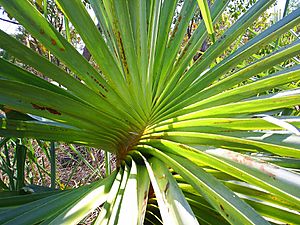Common screwpine facts for kids
Quick facts for kids Common screwpine |
|
|---|---|
 |
|
| Scientific classification |
|
| Kingdom: | Plantae |
| Clade: | Tracheophytes |
| Clade: | Angiosperms |
| Clade: | Monocots |
| Order: | Pandanales |
| Family: | Pandanaceae |
| Genus: | Pandanus |
| Species: |
P. spiralis
|
| Binomial name | |
| Pandanus spiralis |
|
| Script error: The function "autoWithCaption" does not exist. | |
| Synonyms | |
|
|
Script error: No such module "Check for conflicting parameters".
The common screwpine (scientific name: Pandanus spiralis) is a unique plant found in northern Australia. Even though it's called a "pine" or "palm," it's actually neither! It's a special type of plant known for its long, spiky leaves that grow in a spiral pattern.
Contents
Where Does the Screwpine Grow?
The common screwpine lives in the northern parts of Australia. You can find it in places like Queensland, the Northern Territory, and the very top of Western Australia. It also grows in northern New South Wales.
This plant loves to be near water! It often grows along rivers, streams, and close to the coast. You might see it on sand dunes or near the ocean.
What Does the Screwpine Look Like?
The common screwpine can be a large shrub or a small tree. It can grow up to 10 metres (about 33 feet) tall. Its most noticeable feature is its long, spiky leaves. These leaves are arranged in a cool spiral shape, which is how it got the name "screwpine."
The plant also grows large fruits that look a bit like a pineapple. When these fruits are ready to eat, they turn a bright orange-red colour.
Home for Wildlife
Many animals, especially birds, love the common screwpine. The spiky leaves offer a safe place for them to live. It's like a natural fortress that protects them from predators. Birds also enjoy eating the plant's tasty fruit.
How People Use the Screwpine
The common screwpine is very useful to people, especially the Aboriginal communities in Australia.
Crafting and Tools
The strong leaves of the screwpine can be used for weaving. People make beautiful neckbands and armbands from them. The tough fibres from the leaves can also be turned into string. This string is used to make traditional dillybags, which are woven bags for carrying things.
Other useful items made from screwpine leaves include baskets, mats, and even parts of shelters.
Traditional Medicine and Food
Beyond crafts, the screwpine has other important uses. If someone has a headache, mashed leaves can be tied around their head to help them feel better.
The fruit of the screwpine is also valuable. The seeds inside the fruit can be ground into a fine flour. This flour can then be used to make food.
Fishing Traps
The Burarra people, an Aboriginal group, are very clever with the screwpine. They use parts of the plant to create special fish traps. This shows how important the plant is for their traditional way of life and for getting food.
Gallery
 | Leon Lynch |
 | Milton P. Webster |
 | Ferdinand Smith |



